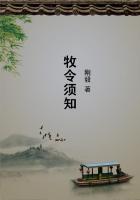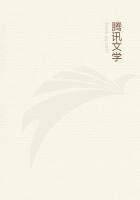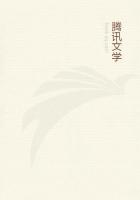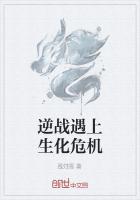Another refinement of the same principle is due to the ingenuity of the German peasant. It is said that when one of his pigs or sheep breaks its leg, a farmer of Rhenish Bavaria or Hesse will bind up the leg of a chair with bandages and splints in due form. For some days thereafter no one may sit on that chair, move it, or knock up against it; for to do so would pain the injured pig or sheep and hinder the cure. In this last case it is clear that we have passed wholly out of the region of contagious magic and into the region of homoeopathic or imitative magic; the chair-leg, which is treated instead of the beast's leg, in no sense belongs to the animal, and the application of bandages to it is a mere simulation of the treatment which a more rational surgery would bestow on the real patient.
The sympathetic connexion supposed to exist between a man and the weapon which has wounded him is probably founded on the notion that the blood on the weapon continues to feel with the blood in his body. For a like reason the Papuans of Tumleo, an island off New Guinea, are careful to throw into the sea the bloody bandages with which their wounds have been dressed, for they fear that if these rags fell into the hands of an enemy he might injure them magically thereby. Once when a man with a wound in his mouth, which bled constantly, came to the missionaries to be treated, his faithful wife took great pains to collect all the blood and cast it into the sea. Strained and unnatural as this idea may seem to us, it is perhaps less so than the belief that magic sympathy is maintained between a person and his clothes, so that whatever is done to the clothes will be felt by the man himself, even though he may be far away at the time. In the Wotjobaluk tribe of Victoria a wizard would sometimes get hold of a man's opossum rug and roast it slowly in the fire, and as he did so the owner of the rug would fall sick. If the wizard consented to undo the charm, he would give the rug back to the sick man's friends, bidding them put it in water, so as to wash the fire out. When that happened, the sufferer would feel a refreshing coolness and probably recover.
In Tanna, one of the New Hebrides, a man who had a grudge at another and desired his death would try to get possession of a cloth which had touched the sweat of his enemy's body. If he succeeded, he rubbed the cloth carefully over with the leaves and twigs of a certain tree, rolled and bound cloth, twigs, and leaves into a long sausage-shaped bundle, and burned it slowly in the fire. As the bundle was consumed, the victim fell ill, and when it was reduced to ashes, he died. In this last form of enchantment, however, the magical sympathy may be supposed to exist not so much between the man and the cloth as between the man and the sweat which issued from his body. But in other cases of the same sort it seems that the garment by itself is enough to give the sorcerer a hold upon his victim. The witch in Theocritus, while she melted an image or lump of wax in order that her faithless lover might melt with love of her, did not forget to throw into the fire a shred of his cloak which he had dropped in her house. In Prussia they say that if you cannot catch a thief, the next best thing you can do is to get hold of a garment which he may have shed in his flight; for if you beat it soundly, the thief will fall sick. This belief is firmly rooted in the popular mind. Some eighty or ninety years ago, in the neighbourhood of Berend, a man was detected trying to steal honey, and fled, leaving his coat behind him. When he heard that the enraged owner of the honey was mauling his lost coat, he was so alarmed that he took to his bed and died.
Again, magic may be wrought on a man sympathetically, not only through his clothes and severed parts of himself, but also through the impressions left by his body in sand or earth. In particular, it is a world-wide superstition that by injuring footprints you injure the feet that made them. Thus the natives of South-eastern Australia think that they can lame a man by placing sharp pieces of quartz, glass, bone, or charcoal in his footprints. Rheumatic pains are often attributed by them to this cause. Seeing a Tatungolung man very lame, Mr. Howitt asked him what was the matter. He said, some fellow has put bottle in my foot. He was suffering from rheumatism, but believed that an enemy had found his foot-track and had buried it in a piece of broken bottle, the magical influence of which had entered his foot.
Similar practices prevail in various parts of Europe. Thus in Mecklenburg it is thought that if you drive a nail into a man's footprint he will fall lame; sometimes it is required that the nail should be taken from a coffin. A like mode of injuring an enemy is resorted to in some parts of France. It is said that there was an old woman who used to frequent Stow in Suffolk, and she was a witch. If, while she walked, any one went after her and stuck a nail or a knife into her footprint in the dust, the dame could not stir a step till it was withdrawn. Among the South Slavs a girl will dig up the earth from the footprints of the man she loves and put it in a flower-pot. Then she plants in the pot a marigold, a flower that is thought to be fadeless. And as its golden blossom grows and blooms and never fades, so shall her sweetheart's love grow and bloom, and never, never fade. Thus the love-spell acts on the man through the earth he trod on. An old Danish mode of concluding a treaty was based on the same idea of the sympathetic connexion between a man and his footprints: the covenanting parties sprinkled each other's footprints with their own blood, thus giving a pledge of fidelity. In ancient Greece superstitions of the same sort seem to have been current, for it was thought that if a horse stepped on the track of a wolf he was seized with numbness; and a maxim ascribed to Pythagoras forbade people to pierce a man's footprints with a nail or a knife.

